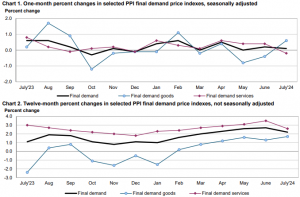August 13, 2024
The Producer Price Index (PPI) for final demand in the U.S. increased by 0.1 percent in July on a seasonally adjusted basis, as reported by the U.S. Bureau of Labor Statistics. This follows a 0.2 percent rise in June and no change in May. Over the 12 months leading up to July, the index for final demand rose by 2.2 percent on an unadjusted basis.
The July increase in the index for final demand was primarily driven by a 0.6 percent rise in prices for final demand goods. In contrast, prices for final demand services fell by 0.2 percent during the same period.
Excluding the volatile categories of foods, energy, and trade services, the index for final demand increased by 0.3 percent in July, following a 0.1 percent increase in June. Over the year ending in July, this core index (excluding foods, energy, and trade services) rose by 3.3 percent.
Final demand goods
Prices for final demand goods increased by 0.6 percent in July, the largest rise since a 1.1 percent jump in February. The increase was broad-based, with nearly 60 percent of it attributed to a 1.9 percent rise in the index for final demand energy. Additionally, prices for final demand goods excluding foods and energy went up by 0.2 percent, and final demand foods rose by 0.6 percent.
Regarding specific products, a quarter of the overall increase in final demand goods was due to a 2.8 percent rise in gasoline prices. Other notable increases were seen in the prices of diesel fuel, meats, jet fuel, fresh fruits and melons, and basic organic chemicals. On the other hand, prices for electric power fell by 1.1 percent, and the indexes for fresh and dry vegetables and steel mill products also declined.
Final demand services
In July, prices for final demand services decreased by 0.2 percent, marking the largest drop since March 2023. This decline was primarily driven by a 1.3 percent decrease in the index for final demand trade services, which measures changes in the margins received by wholesalers and retailers. Conversely, prices for final demand services, excluding trade, transportation, and warehousing, rose by 0.3 percent, while prices for transportation and warehousing services increased by 0.4 percent.
In terms of specific services, the most significant decline was in the margins for machinery and vehicle wholesaling, which fell by 4.1 percent. Other notable decreases were observed in food and alcohol retailing, automobile retailing (partial), automotive fuels and lubricants retailing, desktop and portable device application software publishing, and physician care. On the other hand, prices for portfolio management services saw a 2.3 percent increase. Additionally, the indexes for chemicals and allied products wholesaling and truck transportation of freight also experienced rises.

Disclaimer:
Analyst Certification – The views expressed in this research report accurately reflect the personal views of Mayberry Investments Limited Research Department about those issuer(s) or securities as at the date of this report. Each research analyst (s) also certify that no part of their compensation was, is, or will be, directly or indirectly, related to the specific recommendation(s) or view(s) expressed by that research analyst in this research report.
Company Disclosure – The information contained herein has been obtained from sources believed to be reliable, however its accuracy and completeness cannot be guaranteed. You are hereby notified that any disclosure, copying, distribution or taking any action in reliance on the contents of this information is strictly prohibited and may be unlawful. Mayberry may effect transactions or have positions in securities mentioned herein. In addition, employees of Mayberry may have positions and effect transactions in the securities mentioned herein.






